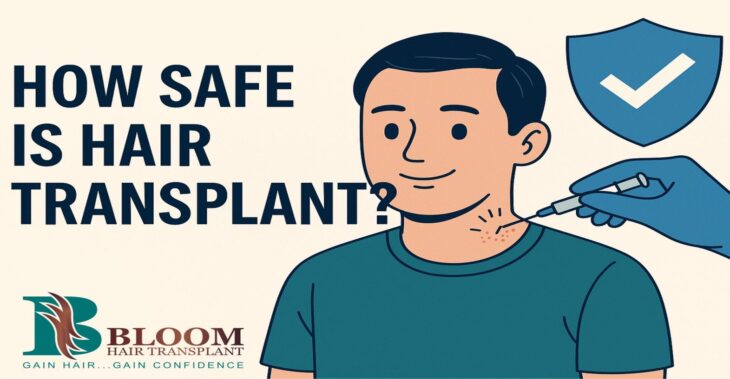
How Safe Is Hair Transplant? A Complete Guide
Hair loss can feel overwhelming, but with modern solutions like hair transplants, restoring your hair and confidence has never been more achievable. Yet one question often stops people in their tracks: How safe is hair transplant?
If you’ve been wondering whether this procedure is the right step for you, let’s break it down and explore everything you need to know about safety, risks, and the safest hair transplant methods available today.
Are Hair Transplants Safe?
The short answer: yes, hair transplants are generally very safe when performed by experienced surgeons at a reputable clinic.
Today’s hair restoration techniques have advanced significantly, making the procedure minimally invasive with little to no risk of major complications.
At Bloom Hair Transplant, for example, we use cutting-edge technology and follow strict medical protocols to ensure your safety at every step.
Why Hair Transplants Are Considered Safe
Hair transplants have become one of the most popular solutions for hair restoration – and for good reason. Over the years, advancements in technology and technique have made the procedure safer, more effective, and more comfortable for patients. Here’s why experts and patients alike consider hair transplants a safe and reliable option:
Minimally Invasive Procedure
Modern hair transplant methods such as Follicular Unit Extraction (FUE) and Direct Hair Implantation (DHI) are designed to be minimally invasive. These techniques use micro-tools to extract and implant individual hair follicles, requiring only tiny, precise incisions. This approach eliminates the need for large cuts or stitches, significantly reducing the risk of complications, leaving no visible linear scars, and ensuring a much faster healing process. Most patients experience minimal discomfort during and after the procedure.
Performed Under Local Anaesthesia
Hair transplants are typically carried out under local anaesthesia, which numbs only the scalp area where the procedure is performed. This eliminates the risks associated with general anaesthesia, such as respiratory or cardiovascular complications, and allows patients to remain awake and comfortable throughout the process. The use of local anaesthesia also means a quicker recovery period and fewer post-procedure restrictions.
High Success Rates
Thanks to advanced surgical techniques and the expertise of trained professionals, modern hair transplants boast impressive success rates. The transplanted follicles are carefully placed to ensure they take root in their new location and continue to grow naturally over time. With proper post-operative care, the majority of patients achieve excellent, long-lasting results that look and feel completely natural.
A Proven Track Record Worldwide
Hair transplantation is not a new concept – it has a long history of safe and successful outcomes. Over the past few decades, millions of people around the world have opted for hair transplants as a permanent solution to hair loss. Clinics across the globe continue to refine and improve techniques, making the procedure even safer and more reliable for new patients today.
Minimal Downtime and Low Risk of Complications
Most patients can resume their normal routine within a few days of the procedure. Side effects like mild swelling, redness, or scabbing are usually temporary and resolve on their own. With a qualified surgeon and proper aftercare, serious complications are extremely rare, making hair transplants one of the safest cosmetic procedures available today.
Common Side Effects (and Why They’re Temporary)
Like any medical procedure, hair transplants can have mild side effects, but they are usually short-lived and easy to manage. These may include:
- Swelling or redness in the scalp area
- Itching or mild discomfort as the scalp heals
- Temporary shedding of transplanted hair (a normal process before new growth begins)
With proper aftercare and guidance from your surgeon, these effects typically resolve within a few days to weeks.
What’s the Safest Hair Transplant Method?
Wondering about the safest hair transplant method? Modern techniques like FUE and DHI (Direct Hair Implantation) are widely considered the most advanced and safest options.
- FUE (Follicular Unit Extraction)
It is a minimally invasive procedure with no stitches or linear scars. Promising a quick recovery and natural-looking results
- DHI (Direct Hair Implantation)
Uses a pen-like device for precision, which reduces the time follicles spend outside the body. Ensuring a higher survival rate for grafts
Both methods are performed under strict hygiene and safety protocols at Bloom Hair Transplant to minimise any risks.
How to Ensure a Safe Hair Transplant Experience
Your safety depends on where and how you get your transplant done. Here’s how to ensure the best possible outcome:
Choose an Experienced Clinic: Go for clinics like Bloom that specialise in hair restoration and have a proven track record.
Get a Thorough Consultation: A proper evaluation helps determine if you’re a suitable candidate and sets realistic expectations.
Follow Aftercare Guidelines: Post-procedure care is crucial for healing and preventing complications.
Safety First
If you’ve been asking yourself – Is hair transplant safe? Then the answer is reassuring: yes, it’s a safe and effective solution for most people struggling with hair loss. At Bloom Hair Transplant, we combine expert surgeons, advanced technology, and personalised care to give you natural results safely.
Ready to take the next step? Book your free consultation today and let us guide you on your journey to fuller, healthier hair.

